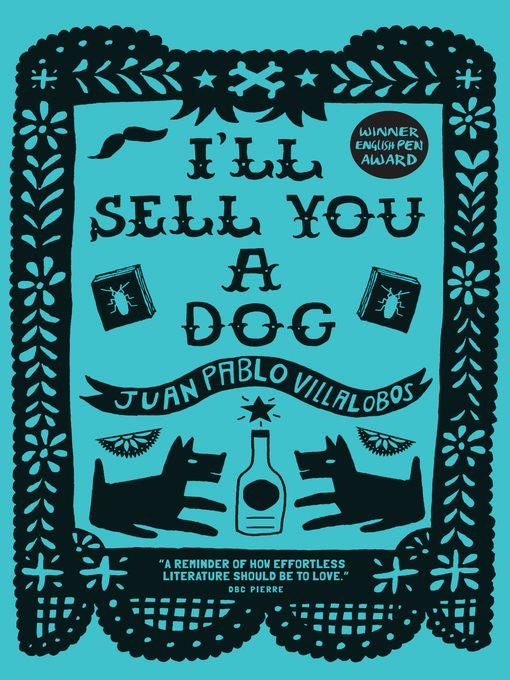
I'll Sell You a Dog
کتاب های مرتبط
- اطلاعات
- نقد و بررسی
- دیدگاه کاربران
نقد و بررسی

June 6, 2016
The latest slice of Mexican life from Villalobos (Quesdillas) is narrated by a 78-year-old onetime artist and full-time drunk known only as Teo, more renowned for his dog-meat tacos than his art, who retires to a cockroach-infested apartment in Mexico City. But, as in Villalobos’s previous novels, the plot is secondary to depicting the community, the comings and goings of the local eccentrics who congregate around the narrator’s building to drink and gossip: there’s the literary salon, which is inexplicably convinced that Teo is writing a great novel, the paranoid anarchist greengrocer called Juliet with whom Teo is mildly smitten, and a Mormon missionary from Utah named Willem Heda who finds meaning in the extermination of cockroaches. After a local dog dies, Teo becomes the leading suspect and amuses himself by matching wits with the main investigator, a would-be writer with a papaya-shaped head; Teo even goes so far as to enlist another local (a young Maoist named Mao) in the infiltration of the Society for the Protection of Animals. Meanwhile, Teo mourns for what he’s lost—various dogs come and gone, his mother and sister, both killed in the 1985 earthquake—and applies to life the lessons of art (a copy of Adorno’s Aesthetic Theory is his bible) until it dawns on him he may be writing a novel after all. Villalobos is a kind of miniature Proust, and the affable I’ll Sell You A Dog finds lost time not in grand narratives but in the idle chatter of neighbors.

Starred review from June 15, 2016
A novel of retirement, regret, and revolution in Mexico City.Teo, short for Teodoro, which may or may not be his real name, lives in an old, broken-down building where the cockroaches run rampant. Teo is approaching 80. Every day he drinks. He drinks either in the bar on the corner; with the greengrocer, Juliet, whom he calls Juliette; or in his room, with a Mormon missionary named Willem (whom he calls Villem) or with a young revolutionary named Mao, who may not be a revolutionary and may not be named Mao. Teo either keeps track of his drinks, or he loses count. "Maybe if you didn't drink so much..." is a refrain he hears often. Teo had a long career as a taco seller in Mexico City, but before that he was an aspiring artist. Then he gave up his ambition to support his mother, who'd been abandoned by his father and began taking in stray dogs, to whom she bestowed names like Market and Eighty-Three, for the place and the year, respectively, she found them. Now Teo carries around a copy of Adorno's Aesthetic Theory, from which he reads passages to telemarketers and anyone else who annoys him. He carries on an ever escalating battle with the "literary salon" that meets on the first floor of his building. When the salon kidnaps Teo's Aesthetic Theory, he takes revenge on their bulky copies of In Search of Lost Time. Throughout this lark of a novel, there are many appearances by dogs, some of whom die, ignominiously, by strangling, some of whom are sold, illegally, as taco meat, and some of whom roam the streets in lonely, mangy packs. This is the third novel by Villalobos (Quesadillas, 2014, etc.), and it should help establish his reputation as a maniacally witty writer of satire and absurdity. He takes on Mexican history, literary theory, and the just-scraping-by lives of the 99 percent, all while telling a damn good story. He has a novelist's eye for detail, a painter's for image, and a poet's for turn of phrase. Remember those cockroaches? They "take advantage" of the building's elevator to ride "downstairs to visit their associates." A wry, sardonic romp made even more vibrant by its various satires and absurdities.
COPYRIGHT(2016) Kirkus Reviews, ALL RIGHTS RESERVED.

August 1, 2016
In his retirement, Teo has landed in a building full of decrepit literary dilettantes who are convinced that the old taco vendor is writing a novel. The opening gag compares the building's elevator to the zipper in a pair of pants, setting the comic and sexual tension between Teo and his nemesis neighbor, Francesca, the book-club tyrant. Teo narrates, alternating between his present and past. In the former, he navigates a route to the corner cantina and the grocer's while dodging his neighbors and befriending young Mormon missionaries and Maoists. He also spends a lot of time killing cockroaches with Theodor Adorno's Aesthetic Theory. His past is full of disappointments: losing his father after the family dog died from ingesting his father's lover's stockings, leaving art school to become a taco vendor, and unrequited love. Mexican author Villalobos' (Quesadillas, 2014) third novel skewers art, life, love (or lust) with brio as he sets absurd situations against a dreary backdrop of Mexico's revolutions, corruption, disappearances, and violence. A fun read, especially for those intrigued by Mexico and literary criticism.(Reprinted with permission of Booklist, copyright 2016, American Library Association.)

























دیدگاه کاربران